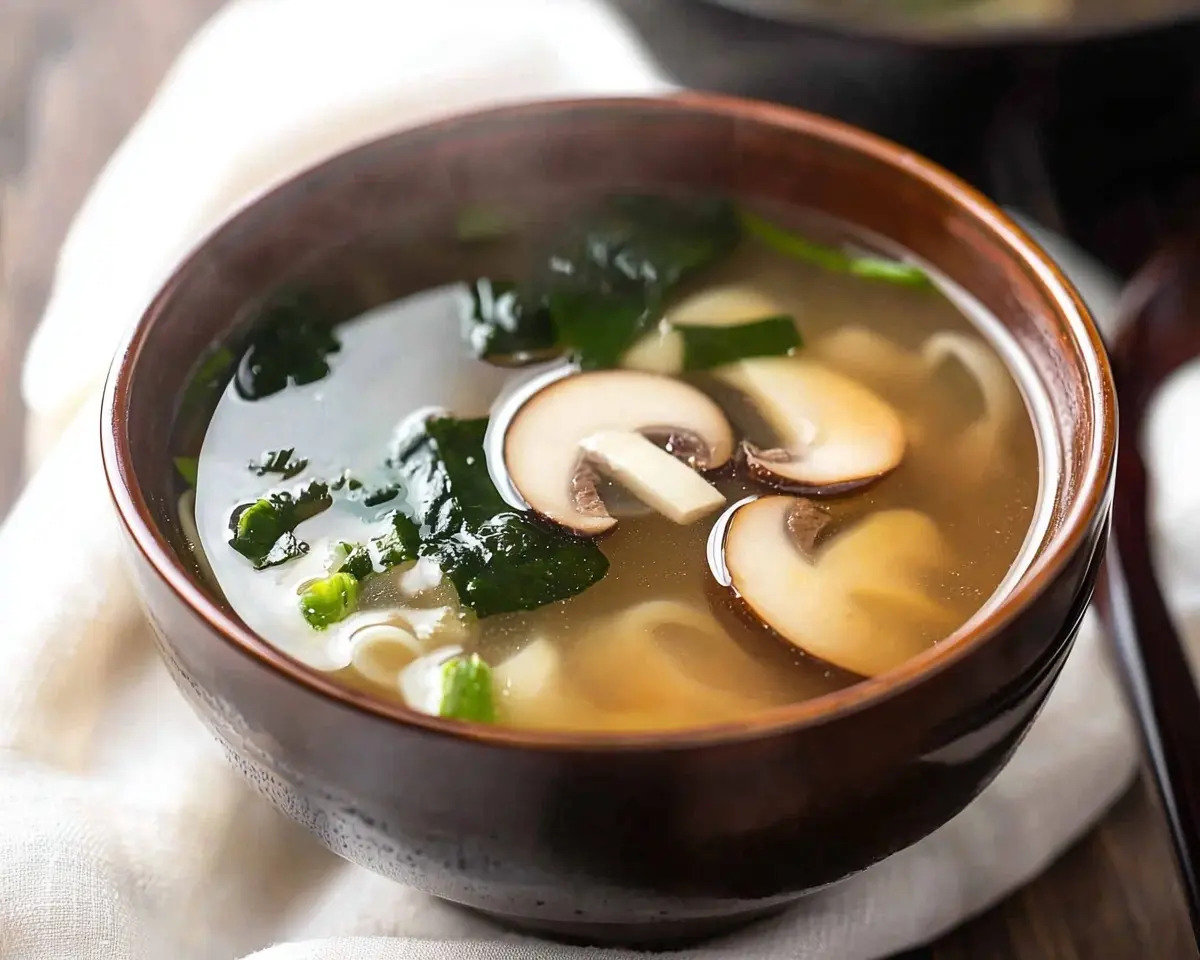Japanese clear soup recipe with authentic flavors. Learn this colorful Japanese soup recipe using simple ingredients for healthy, restaurant-quality results.
Hi, I’m Linda, and welcome to Tasty at Home—where bold flavors meet everyday kitchens. Let me tell you about the moment this Japanese clear soup recipe changed everything for me. Picture this: a rainy Tuesday evening in Seattle, scrolling through food blogs while my stomach growled impatiently.
Well… I stumbled across a tiny Japanese restaurant review that mentioned their “liquid gold” clear soup. Naturally, I had to try it. One sip transported me straight to a cozy Tokyo kitchen where simplicity meets perfection. However, the $12 price tag for a small bowl made my wallet weep.
That’s when I knew I had to crack the code. After testing this recipe fifteen times—and yes, I burned the garlic twice—I finally nailed the perfect balance. This Japanese clear soup recipe delivers restaurant-quality flavor without breaking the bank.
You know what makes this different from other soup recipes? Most clear soups taste like glorified water. This one? It’s packed with umami depth that’ll make your taste buds dance. Whether you’re battling a cold or craving comfort food, this colorful Japanese soup recipe has your back.
Table of Contents
What Makes This Japanese Clear Soup Recipe Special
This isn’t your average soup in Japanese cuisine. Traditional clear soups often rely heavily on dashi, which requires specialty ingredients many American home cooks don’t have on hand. Instead, this recipe builds incredible depth using accessible ingredients from any US grocery store.
The secret lies in the caramelization process. By searing our vegetables first, we create a complex flavor foundation that mimics the umami-rich quality of authentic Japanese broths. Furthermore, the combination of chicken and beef broths adds layers most single-broth recipes miss.
Ingredients for Japanese Clear Soup Recipe
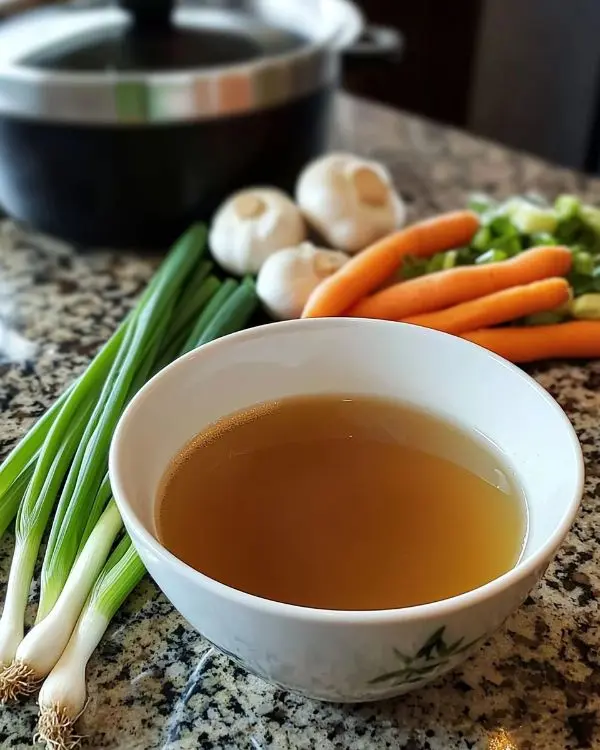
| Ingredient | US Measurement | Metric | Notes |
|---|---|---|---|
| Sesame oil (or peanut oil) | 2 teaspoons | 10ml | For searing vegetables |
| Chicken broth | 8 cups | 1.9L | Low-sodium preferred |
| Beef broth | 4 cups | 950ml | Adds depth and richness |
| Water | 4 cups | 950ml | Balances the intensity |
| Sweet onion | 1 large | ~300g | Yellow onion works too |
| Garlic cloves | 6 cloves | – | Smashed, not minced |
| Carrots | 2 large | ~200g | Cut into chunks |
| Fresh ginger | 2-inch piece | ~50g | Sliced, not grated |
| Scallions | 4 whole | – | Reserve for garnish |
| Button mushrooms | 10 mushrooms | ~150g | Sliced thin |
| Salt | To taste | – | Start with 1 teaspoon |
Shopping Tips for US Grocery Stores
When shopping for this healthy Japanese soup dish, head to the produce section first. Look for firm, unblemished sweet onions—they caramelize beautifully and add natural sweetness. Meanwhile, choose carrots that feel heavy for their size and have bright orange color.
For the ginger, avoid wrinkled or soft spots. Fresh ginger should have tight, smooth skin. Additionally, select button mushrooms with closed caps and no dark spots. They’ll hold their shape better during cooking.
Pro tip: Oops! I used to buy pre-minced garlic for convenience, but it lacks the punch whole cloves provide. Smashed garlic releases more flavor compounds than minced versions.
Essential vs. Bold Add-ins
Essential Ingredients:
- Sesame oil provides that signature Japanese aroma
- Double broth combination creates complexity
- Aromatics (onion, garlic, ginger) build the flavor base
Bold Add-ins for Variation:
- Shiitake mushrooms instead of button mushrooms
- Miso paste (1 tablespoon) for extra umami
- Kombu seaweed for authentic dashi notes
- White pepper instead of black pepper
International Substitutions
Don’t have sesame oil? Neutral oils work, but you’ll miss that nutty flavor. Similarly, if beef broth isn’t available, use additional chicken broth plus a tablespoon of soy sauce for depth.
Equipment and Preparation Steps
Necessary Equipment
You’ll need an 8-quart stock pot—this recipe makes a generous batch perfect for meal prep. A fine-mesh skimmer becomes essential for removing vegetables cleanly. Additionally, keep a ladle handy for serving.
DIY Alternative: No skimmer? Use a slotted spoon, though it takes longer to fish out all the vegetable pieces.
Step-by-Step Japanese Clear Soup Recipe Instructions
Step 1: Caramelize the Aromatics (8-10 minutes)
Place your 8-quart stock pot over medium-high heat. Add sesame oil and let it shimmer—this takes about 30 seconds. Next, add onion wedges, smashed garlic, carrot chunks, and sliced ginger.
Here’s where magic happens: sear these vegetables on all sides until they develop golden-brown edges. The onions should look translucent with caramelized spots. However, watch that garlic carefully—burned garlic turns bitter faster than you can say “soup disaster.”
Timing indicator: You’ll hear gentle sizzling throughout. If the pot goes silent, increase heat slightly.
Step 2: Build the Broth Base (5 minutes)
Pour in chicken broth, beef broth, and water. The liquid should cover vegetables by at least 2 inches. Bring this mixture to a rolling boil over high heat—you’ll see vigorous bubbling across the entire surface.
Common mistake I made: Adding cold broth to hot vegetables created uneven heating. Instead, let everything come up to temperature together for better flavor integration.
Step 3: Simmer for Depth (60+ minutes)
Once boiling, reduce heat to maintain a gentle simmer. You want steady, small bubbles breaking the surface—not a violent boil that’ll make your broth cloudy.
Simmer uncovered for at least one hour. During this time, the vegetables release their essence into the liquid. The broth will reduce slightly and concentrate flavors. Trust me, this patience pays off in spades.
Pro tip from Thomas Keller: Long, gentle simmering extracts maximum flavor without breaking down proteins that cause cloudiness.
Step 4: Strain and Season (10 minutes)
Use your skimmer to remove all vegetables from the broth. Work methodically—you want crystal-clear liquid. Taste your creation and season with salt gradually. Start with half a teaspoon, then adjust.
The finished Japanese clear soup recipe should taste clean yet complex, with subtle sweetness from caramelized vegetables.
Serving Your Colorful Japanese Soup Recipe
Ladle hot broth into warmed bowls—cold bowls will cool your soup too quickly. Sprinkle chopped scallions and sliced raw mushrooms on top. The heat from the broth will barely cook these garnishes, maintaining their fresh texture and bright flavor.
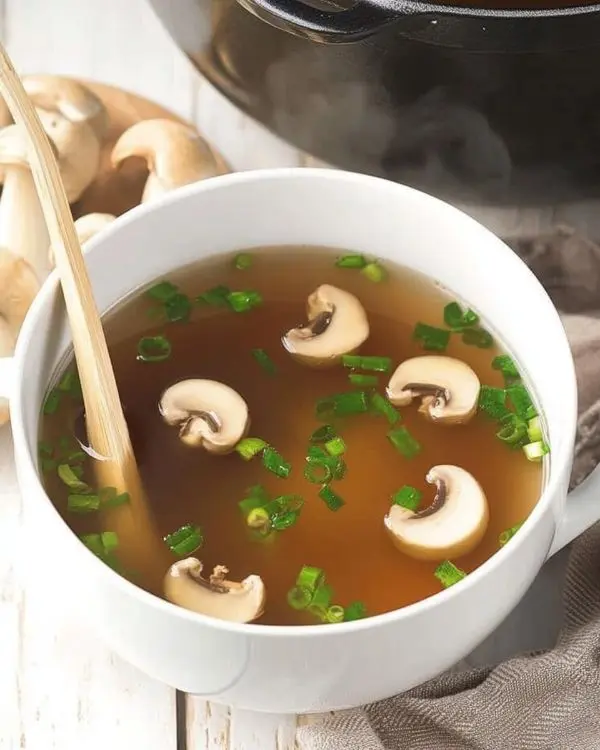
Expert Tips and Creative Variations
Professional Techniques for Best Results
Temperature control matters most. Julia Child always emphasized gentle cooking for clear broths. Aggressive boiling creates cloudy, greasy soup instead of the pristine liquid we’re after.
Strain twice for restaurant quality. First removal gets the big pieces, but a second strain through fine-mesh catches smaller particles.
Season at the end. Salt added too early can concentrate as the broth reduces, leading to overseasoned soup.
Regional and Dietary Variations
West Coast Twist: Add a splash of rice vinegar and julienned cucumber for brightness that complements seafood dishes perfectly.
Holiday Version: During Thanksgiving, incorporate thinly sliced turkey and a few drops of sesame oil for an East-meets-West comfort bowl.
Vegetarian Adaptation: Replace both broths with vegetable stock and add dried shiitake mushrooms during simmering. The result maintains that signature umami depth.
Keto-Friendly Option: This soup in Japanese style naturally fits low-carb diets. Add thinly sliced tofu or extra mushrooms for substance without carbs.
Spicy Variation: Man, oh man, a tiny drizzle of chili oil transforms this mild soup into something with serious kick.
Storage and Make-Ahead Strategy
This healthy Japanese soup dish actually improves overnight as flavors meld. Store strained broth in refrigerator for up to 5 days or freeze for 3 months.
| Storage Method | Duration | Notes |
|---|---|---|
| Refrigerator | 5 days | Store in airtight containers |
| Freezer | 3 months | Leave 2-inch headspace |
| Room Temperature | 2 hours max | For food safety |
Make-ahead tip: Prepare the full broth base ahead, then add fresh garnishes when serving. The scallions and mushrooms stay crisp this way.
Suggested Pairings
This clear soup pairs beautifully with homemade dango for a traditional Japanese experience. Alternatively, serve alongside Japanese pancakes for a more substantial meal.
For American comfort food fusion, try it with grilled cheese sandwiches—the clean broth cuts through rich, cheesy flavors perfectly. You might also enjoy it as a starter before Japanese potato crème brûlée for an elevated dinner party menu.
FAQs About Japanese Clear Soup Recipe
What is Japanese clear soup made of?
Japanese clear soup traditionally contains dashi (a broth made from kombu seaweed and bonito flakes), vegetables, and garnishes. However, this accessible version uses chicken and beef broths with caramelized aromatics to create similar depth and complexity without specialty ingredients.
What are the ingredients of clear soup?
Clear soup ingredients typically include aromatic vegetables (onions, garlic, ginger), quality broths, and fresh garnishes like scallions and mushrooms. The key lies in building flavor through proper searing and long, gentle simmering rather than relying on heavy seasonings.
What is clear soup called in Japanese?
Clear soup is called “suimono” in Japanese, which literally means “something to drink.” This colorful Japanese soup recipe represents the essence of suimono—clean, flavorful broth that cleanses the palate and nourishes the body.
What is dashi, the base for clear soup?
Dashi is the fundamental broth in Japanese cooking, made from kombu seaweed and dried fish flakes. While traditional, it requires specialty ingredients. This recipe achieves similar umami richness using accessible American grocery store items, making authentic flavors achievable for home cooks everywhere.
Bringing It All Together: Your Perfect Bowl Awaits
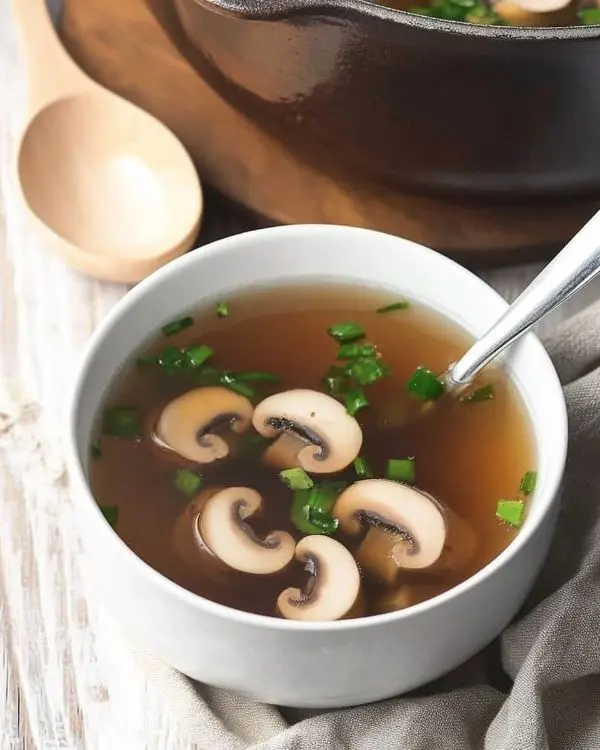
Creating this Japanese clear soup recipe connects us to centuries of culinary wisdom while adapting to modern American kitchens. The gentle simmering process becomes almost meditative—a welcome break from our hectic schedules.
Remember that rainy Seattle evening I mentioned earlier? Now my kitchen fills with the same comforting aromas whenever I crave something soul-warming. This soup tastes like a warm hug in liquid form, perfect for chilly afternoons or when you need something light yet satisfying.
Serve this healthy Japanese soup dish alongside crusty sourdough bread or pair it with a simple Halloween pasta salad for seasonal variety. The clean flavors complement rather than compete with other dishes.
Share your version on social media and tag us—we love seeing how you make this recipe your own. Add extra vegetables, experiment with different garnishes, or create your own fusion twist. That’s the beauty of home cooking: every bowl tells your unique story.
Tasty at Home – Where bold flavors meet everyday kitchens.
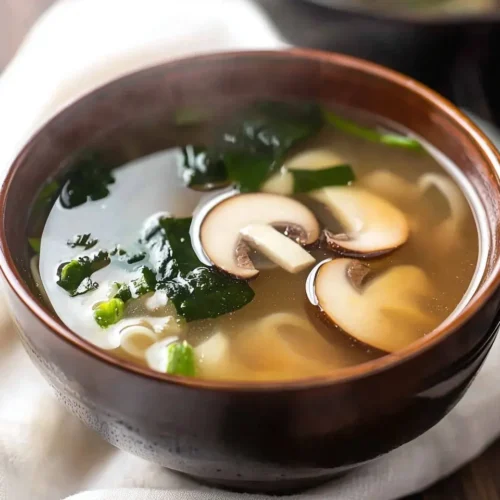
Japanese Clear Soup
Equipment
- 8-quart stock pot
- fine-mesh skimmer
- Ladle
- Slotted spoon
Ingredients
Ingredients
- 2 teaspoons Sesame oil (or peanut oil) For searing vegetables
- 8 cups Chicken broth Low-sodium preferred
- 4 cups Beef broth Adds depth and richness
- 4 cups Water Balances the intensity
- 1 large Sweet onion Yellow onion works too (~300g)
- 6 cloves Garlic Smashed, not minced
- 2 large Carrots Cut into chunks (~200g)
- 1 piece Fresh ginger 2-inch (~50g), sliced, not grated
- 4 whole Scallions Reserve for garnish
- 10 mushrooms Button mushrooms Sliced thin (~150g)
- 1 teaspoon Salt Adjust to taste
Instructions
- Place stock pot over medium-high heat. Add sesame oil and let it shimmer. Add onion, garlic, carrots, and ginger. Sear until caramelized and golden-brown.
- Pour in chicken broth, beef broth, and water. Bring mixture to a rolling boil over high heat.
- Reduce heat to a gentle simmer and cook uncovered for at least 60 minutes, allowing flavors to concentrate.
- Strain out vegetables with a skimmer or slotted spoon. Season broth gradually with salt to taste.
- Serve hot in warmed bowls. Garnish with chopped scallions and thinly sliced mushrooms.

